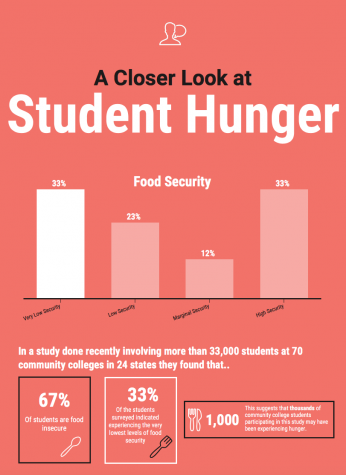Food For Thought
Your alarm goes off, beeping in your ear. You reach over and grab your phone and tap the snooze button. Five more minutes you think, just five more minutes. You’re exhausted from the long night you just had writing and finalizing papers that’re due the next day. Five minutes pass and your alarm beeps off again. Snooze. Snooze. Snooze. Before you know it, twenty minutes have passed. You’re late. Class starts at 8 o’clock and you still have to made it out of bed. You jump up, throw on clothes. “I’ll just skip breakfast today and wait till lunch..” You think to yourself as you grab your keys and run out the door.
When food skipping starts to become a ritual it can have a plethora of different effects on the body. Just to name a few, skipping meals can cause fatigue, mood swings, and irritability. Skipping meals slows you down. Food is fuel for your body and when it’s lacking we get run down and tired, making it hard to focus and make it through the day. Along with all of this, skipping meals and not eating can cause you to get sick much easier.
In a study done recently involving more than 33,000 students at 70 community colleges in 24 states they found that that 67 percent of the students are food insecure, 33 percent of students surveyed indicated experiencing the very lowest levels of food security. This suggests that thousands of community college students participating in this study may have been experiencing hunger. In this study they also logged the responses to specific items in USDA based on a 6-item food security scale. 52 percent of students said that the food that they bought just didn’t last and they didn’t have enough money to get more. 60 percent of students said “I couldn’t afford to eat balanced meals.” 46 percent of students said they have cut the size of their meals or skipped meals because there wasn’t enough money for food. 43 percent of students said that they have eaten less than they felt they should because there wasn’t enough money and 36 percent of students were were hungry but didn’t eat because there wasn’t enough money for food.
Students are suffering because they are struggling to make ends meat and afford enough food that is not only nutritious for them but the kind of food that they should be eating. “Between paying rent, paying utilities and then trying to buy food, that’s where we see the most insecurity because that’s the most flexible,” said Monica Gray, director of programs at the College Success Foundation-District of Columbia. So what can we do about it?
College food banks have started popping up at many schools and have been very successful and effective. Colleges have been searching for solutions and these campus food banks might just be the answer. Park University student Gabrielle Severns says, “I think foodbanks for the university would be awesome. They would help so many people, including myself. It would be a great way for the school to invest in the students and show that they’re really concerned about us not only as students but as individuals and humans.” The number of college food pantries have increased rapidly over the past six years. In 2014 there were a total of 121 food banks on college campuses and it’s still rising. Michigan State University Student Food Bank has made a very positive impact with students and it shows that creating a student food bank for more colleges not only can be done, but is being done. MSU student food bank has started advising and encouraging other campuses to get a jump start on them. “Campuses across the country are starting to realize that there is that sector of people who don’t know where their next meal is coming from,” said Nate Smith-Tyge, director of the MSU Student Food Bank. “It’s not only a moral issue but also a curricular and academic issue.”
There is a stigma that surrounds and shames someone that is needing to ask for help. Admitting to someone that you need help can be a daunting and humiliating task. But why should it be? It is okay to admit that you need help and to ask for it. There are always people going through the same thing. Sometimes students don’t even know that help can be offered. “We’ve had kids who’ve called us and said, ‘I haven’t eaten for two days,’ ” Gray said. “Often they’re pretty humiliated because it’s not an ask they want to make. It’s easier to talk about the cost of books or tuition.” This attached stigma makes it difficult to gain useful information because of the shame surrounding it.
Once we get rid of this stigma and start showing that it’s okay that you’re struggling and that the campus is here to help than less students will be dealing with these hunger issues. We must grab this issue by the neck and start making changes. We can see that the use of food banks for college students on campuses is working by the success stories. Michigan State University Student Food Bank is making a difference so let’s follow in their steps and do the same for students here, at Park University.
Click on the graphic below to see how you stack up compared to other college students.

Your donation will support the student journalists of Park University. Your contribution will allow us to cover our annual website hosting costs, freeing up other funds for equipment, printing and training.




